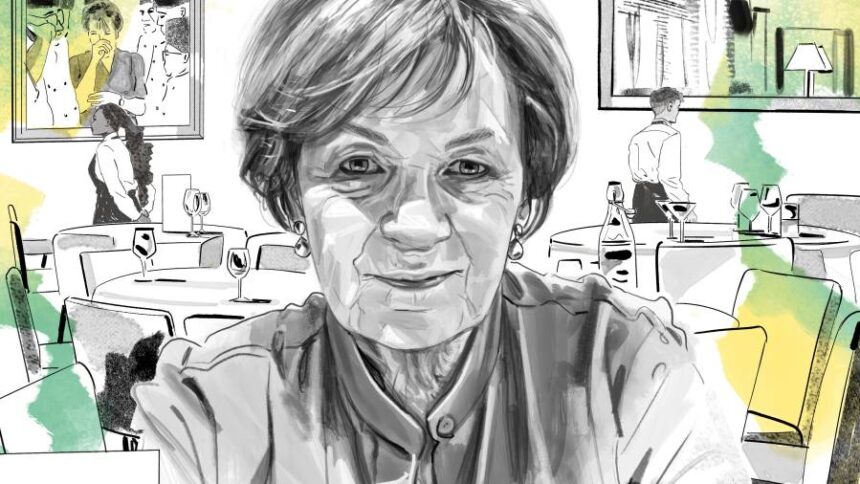Long before we meet, the Lunch with the FT recipe has been heavily tweaked. Instead, I’m joining Delia Smith — groundbreaking TV cook, bestselling author, football club owner — for dinner. We are booked in at Delia’s, the restaurant inside Carrow Road stadium, home of Norwich City Football Club. It only opens on Friday and Saturday evenings, hence the non-regulation kick-off time of 7pm.
A US investor has recently bought into the club, and I’m keen to find out if a chapter of English football is about to close: one where teams are owned by wealthy local fans instead of international capital. I’m also curious to meet one of the most influential people in postwar British cuisine, someone who has masterminded tens of millions of Christmas dinners.
The airy dining room is a blank-canvas space geared towards upscale prematch events. The only picture on the white walls is a large, colourful photograph of the grande dame herself looking bashful in a crowd of uniformed chefs. Soothing hotel lounge jazz is pumped in.
I’m shown to our spot — a round corner table set apart from all the others. An immaculate chestnut bob appears, a smile, a handshake, and we sit.
Before we really get going, Smith gives me a direction. She’s happy to talk about “whatever”, with one proviso: “Just don’t ask me how I got into cooking, please. It’s been written about a million times.”
Smith, now 82, has sold more than 20mn cookbooks and transformed the way people in the UK interact with food. She has been a cultural icon since the 1970s, a British amalgamation of Julia Child and Martha Stewart. At the peak of her powers, her TV shows caused nationwide shortages as viewers rushed to follow her lead. Her name was even included in the Collins English Dictionary. But that’s ancient history, and apparently not worth revisiting. I begin mentally shredding my opening set of questions.
Michelle, our sommelier for the evening, arrives at our side. I suggest a glass of white wine. Smith immediately interjects, “Great, we’ll have a bottle.” We’re off to a promising start. Michelle makes a pre-emptive strike and a bottle of Picpoul is en route.
The menus are handed over and Smith reaches for her spectacles. She scans the list, but of course she likes it all: the food consists entirely of her own recipes, even the Thai green curry. “We tell the chefs when they come here that if they have ideas that are better, we’re happy. But they actually quite like not having to deal with the bother of that.”
I ask for a recommendation, which leads to us both ordering the potted Cromer crab to start. She’s having monkfish for main, I’ve opted for duck with cherries — a Delia classic and the restaurant’s signature dish. Here it’s aged in Himalayan salt by a clever man in Cumbria, I’m told. “We never take it off the menu because we sell so many.”
We’re given bread and some canapés — little slivers of toast, two topped with tapenade and goat’s cheese, two with finely chopped tomatoes. The number of people waiting on us has reached five or six. It will climb higher.
Now East Anglian royalty, Delia Ann Smith was born in Surrey in 1941 and raised in Bexleyheath — her accent still places her on the border of London and Kent. Her father Harold was an RAF radio operator during the war and went into business with a partner in a tool shop after; her mother Etty stayed at home to look after their children.
Smith describes herself as “rotten” at school, leaving at 16 with no qualifications. “I didn’t know how to spell, I didn’t know how to punctuate. But I had a lot to say.”
I ask what she can tell me about her childhood in suburbia. She takes in the question, the silence slowly drifting into awkwardness. “That’s it, really,” she responds, taking a sip of wine to emphasise the full stop. The metaphorical shredder is back in action. We move on.
After school, Smith pitched up in central London at the height of the swinging ’60s, working days as a hairdresser and nights washing dishes at The Singing Chef in Paddington. There she fell in love with food, and began to learn more about it from the archives of the British Museum, sowing the seeds of what would become her trademark method of culinary education: simple, straightforward, rigid. She went on to teach a generation how to cook, first as a newspaper food writer, then on TV and via bestselling books.
“People didn’t know how to cook and they needed somebody to tell them,” she says. “And I’m one of these people that when they see something wrong they want to do something about it. So I did.”
My effort to squeeze a bit of the back-story has led us to the culinary desert of postwar Britain that Smith sought to irrigate. “There was an interruption of handing down cooking from mother to daughter, because there wasn’t any food. In the ’50s and ’60s we had women’s magazines not knowing much, doing things with baked beans and cornflakes.”
Delia’s Restaurant & Bar
Norwich City Football Club, Carrow Rd, Norwich NR1 1JE
Three-course meal x2 £94.90
Potted Cromer crab x2
Roast duck with confit cherries
Monkfish
Delia’s chocolate nut sundae
Berry pavlova
Black coffee
Macchiato
Bottle of Picpoul de Pinet £34
Glass of Pinot Noir £6
Estimated total (incl service) £152 (bill paid by Michael Wynn-Jones)
Smith doesn’t cook much herself these days. “When you’re 82, the standing is quite hard.” Her husband of 52 years, Michael Wynn-Jones, takes charge instead, although he sticks mostly to her back catalogue. She still loves food and cooking, but lost interest in foodie culture long ago. She quit TV in 2013, saying she had exhausted her supply of ideas. “When you’ve been through 20 seasons of asparagus, there’s not an awful lot left you can do with it. Know what I mean?”
The split was likely mutual — viewers had switched over to watch Jamie Oliver race against the kitchen clock, or Nigella Lawson melt chocolate in a bathrobe.
There is no hint of bitterness or regret at departing the stage when she did. Celebrity was never part of the appeal. She despises MasterChef, and never watches The Great British Bake Off. I ask if seeing Prue Leith and Mary Berry, contemporaries of hers, back on primetime TV makes her think about a comeback? “No! I think thank God they’re doing it.”
She also finds the “poncy” approach that dominates the modern restaurant trade utterly grating. “It’s what [cookery writer] Elizabeth David called theatre on a plate. It’s not about real cooking. It’s not what I want to eat.”
Smith’s recipes — including how to boil eggs and how to make toast — at times drew criticism for being patronising. But the public lapped it all up. Delia’s Complete Cookery Course is still in print more than 40 years since its first publication. “Everybody did rubbish it,” she says. “But I was doing it for the people, and that’s where I get appreciation now, every day of my life.”
The Delia approach feels curiously modern in an age where we are constantly learning how to do things at the press of a thumb. She chuckles when I tell her about a YouTube video explaining how to boil eggs that has 38mn views. Her own website offers plenty of similar videos as part of her free online “cookery school”, but nobody knows it’s there, she laments.
The starters have arrived, two triangles of buttered brown bread and a neat little ramekin of crab buried under a haystack of cress, which Smith promptly relocates so that she can sprinkle it over each mouthful.
We switch to modern food trends — does she keep on top of them? Is she experimenting with kimchi, chipotle or sriracha? “I see recipes in magazines and I don’t know what the ingredients are. Food has always been faddish, and I’ve always tried to lie low and let it go.”
Of greater concern is the way younger generations are once again losing the art of cooking, she says, instead relying on takeaways and ready meals. The vilification of meat means that many people no longer appreciate great ingredients, such as a good pork chop.
It brings us neatly to veganism, the current culinary macro-trend and something she feels strongly about. “Everything within me tells me that it’s wrong. If people just want to eat vegetables — and some people do — that’s fine. But don’t say you’re helping the planet, because you’re not. Full stop.”
The topic of climate change and the future of the human race provokes a change in her demeanour. She begins to open up, becoming impassioned, even mournful about the direction we are heading in. It’s not just global warming that worries her, it’s everything. The march of autocracy, rising poverty, creaking political systems. She reels off lists of podcasts and documentaries that have informed her increasingly gloomy world view.
“We are backsliding as a society in every respect, and it’s very distressing. We’re in a very dangerous situation. There is so much horrendous stuff going on in the world. We’re heading for extinction. I just wish someone would wake up to the seriousness of the situation.”
So what’s the solution? “We need young people like you to get rid of all this old rubbish and do something new, do something different.”
Delia Smith, champion of the kitchen’s rules-based order, now an eco-warrior, an iconoclast, a would-be revolutionary. “I’ve got to be careful what I say because what you write will be in the Daily Mail the next day.”
Such feelings are what prompted her most recent book You Matter, a meditation on the power of the individual.
“We’re waiting for something to come along — another leader, another prime minister, somebody to come and do something. But really each of us has a responsibility. What I think is sad is that we’ve had that responsibility dampened — we think we’re not important, we’re just ordinary people. I think we all can do something. It’s big, big, big stuff.”
The heaviness lifts as we get to work on our mains. I yield quickly when offered a glass of Pinot Noir to go with the hunk of duck laid in front of me, the slick purple sauce dotted with sour cherries. Whatever the salt man in Cumbria did has worked a treat — the skin is delicate and crisp, the meat rich and tender. It’s delicious, although the portion size is a little daunting.
Smith’s monkfish looks minuscule by comparison. Our sides of potatoes and green beans will make occasional cameos. “Come on then, let’s do football,” she declares, giving the fourth wall a glancing blow.
Smith and Wynn-Jones have been coming to Norwich as fans for decades. In the 1990s, with the club struggling financially, they bought shares, became directors, and ultimately took control, putting around £12mn into the club over the years. Since then it has enjoyed high and lows, including numerous fleeting spells in the Premier League, football’s richest competition.
She rejects the term “owner”, preferring to call herself a “caretaker” looking after a community asset. Many in football talk like this, but I suspect few mean it like she does.
It’s clear that football, not food, is her true passion. She’s getting itchy about the summer break, and is desperate for the new season to get going.
“When I open the newspaper, I want to know what Palace are doing, I want to know what Man City are doing. I can’t wait to read who’s going where,” she says. “I don’t want to read about golf.”
Smith is part of a vanishing breed in football, an avid fan who made good and picked up the pieces of her beloved, broken club. Now English football is dominated by US billionaires, private equity firms and sovereign wealth funds. Can the game she loves survive?
“One thing that fascinates me about football is that it’s one of the last bastions of community. It’s something incredibly precious. Somehow I believe in it. Somehow we’ll get through. All this money, money, money, one day it’s got to pop.” she says. “Beneath it all there’s this human connection. I don’t think there’s anything else like it.”
She goes on: “If you take a child to football, the one lovely thing they are going to learn is that life is not a bowl of cherries. It’s good and it’s wonderful and it’s thrilling. But it’s also painful and horrible.”
And what of her own stewardship? In September last year, Norwich broke the taboo and brought in overseas investment. Mark Attanasio, an American fund manager and owner of the Milwaukee Brewers baseball team, took a stake in the club and now sits on the board. Is he the heir apparent?
“At the moment we don’t know. He seems like a really good guy. We have no idea what the future will bring. We just have to wait and see. What we have to do now is hand over to people we think will be good caretakers. Football is full of terrible disasters. We won’t have a disaster. We’ll do it properly.”
Does this signal retirement is looming? “No, I won’t ever retire. I can’t not do anything. I can’t just sit down and wait for the six o’clock news. I believe bodies age but souls don’t. Everyone is 19 inside. I really believe that.”
The menu has committed us to three courses, so when asked we take the plunge. Tongue in cheek, she asks for “Delia’s chocolate nut sundae”. I’m having berry pavlova, something my Northern Irish grandma made for us as kids. “They have a thing in France called cuisine grand-mère — that’s what I like,” says Smith. “You don’t want something sprinkled in dust and covered in foam. It’s laughable, except you’re paying a fortune for it.”
I reassure her that I’ve enjoyed a meal with a starter, main and dessert, rather than London’s increasingly ubiquitous “small plates”. Just the mention of those two words — “small plates” — causes her to shudder. “Rubbish!” she blurts out between spoonfuls of slippery chocolate.
We round off with a large black coffee for her, a macchiato for me. Chocolates come too. We’re offered brandies but it feels like a stretch.
As we begin to wrap up, Smith says, “We’re going to make a deal . . . When we’re back in the Premier League, we’re inviting you up — you and the wife and the kids.” Then she adds with a wicked laugh: “I can’t promise when it’ll be. I might not be alive.”
The bill is supposed to be on its way, but Michelle returns empty-handed. It’s been taken care of. The FT rule book has been set alight like a crêpe Suzette. “It’s nothing to do with me,” my dinner companion insists.
It transpires that Wynn-Jones has been tucked away somewhere in the restaurant having his own night out and has forced the issue. The power of the individual feels all too distant now.
After three hours together, we part ways with a warm handshake. “I enjoyed that. I like talking to young people,” she says. “I’m glad we didn’t have to do the whole cookery thing.”
Then she glides off in search of her doting husband, and her ride home.
Josh Noble is the FT’s sports editor
Find out about our latest stories first — follow @ftweekend on Twitter








